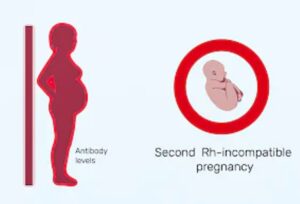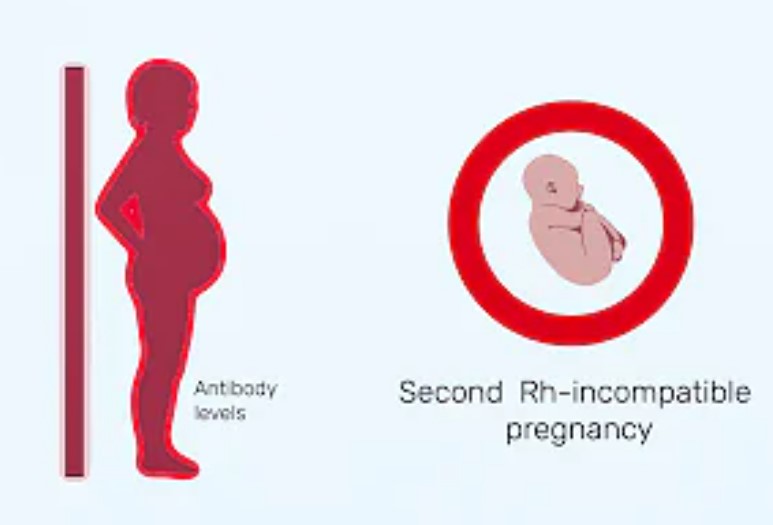Rhesus Factor: All you need to know about Incompatibility
Rhesus Incompatibility is a major cause of repeated miscarriages in some marriages, especially in remote areas where there are poor patronages of antenatal & medical services.
Have you ever heard those stories of married women who were accused of being a witch & eating/killing their unborn babies? Yes, this used to be a common scenario among African families in rural areas when a woman suffers from multiple miscarriages. Many movies still showcase them. Their proof would be that the man has slept with another woman who successfully carried his pregnancy to term and delivered it successfully.
Whereas, these miscarriages could be a result of a simple rhesus incompatibility between both partners. This is a very serious issue in our clime, and a lot of understanding is needed in dealing with these issues. See other causes of recurrent miscarriages here.
What is Rhesus Incompatibility
Rhesus Incompatibility occurs when the rhesus factors in the blood group of prospective or living partners/couples are different. If the Rhesus Status of your partner or spouse is not compatible with yours & you do nothing about it, it can lead to repeated miscarriages, jaundice in your baby & stillbirths.
What is the Rhesus Factor?
There is a substance (antigen) found in our blood that is known as the Rhesus Factor. It divides us into two different groups. Those who have this substance in their blood, are classified as Rhesus Positive. Those who do not have it in their blood are classified as Rhesus Negative. Just like the popular ABO blood group, it is also hereditary.
Simply Put;
Every person’s blood group can either be A, B, AB, or O. Similarly, we are all classified as Rhesus Positive (Rh+) or Rhesus Negative (Rh-). This depends on whether you have a protein called Rhesus Antigen on the surface of your red blood cells or not.
If you have rhesus antigens on your red blood cells, you are RHESUS POSITIVE.
If you don’t have rhesus antigens on your red blood cells, you are RHESUS NEGATIVE.
The “+” or “-” sign usually attached to your blood group stands for your rhesus status!
The majority of people in our environment (over 95%) are Rh+. So blood groups A+, B+, AB+, & O+ are fairly common. Only a few people in this environment (less than 5%) are Rh-. That’s why blood groups A-, B-, AB- & O- are very scarce when needed in times of blood transfusion.
Studies have shown that only 15% of women worldwide are Rh-. The rest are Rh+.
Rhesus Factor & Pregnancy
You would wonder why this condition is very important and why this rhesus test is among the 9 crucial tests you must do before getting married. Let me explain why.
If an Rh-woman is impregnated by a Rh+ man, there is a high risk of Rhesus Incompatibility in that pregnancy. Rhesus incompatibility happens when there’s a mixture of Rh+ & Rh- blood. This leads to very severe reactions.
For example, it can happen during blood transfusion, accidental exchange of blood (like in accidents), & during pregnancy-related events. We’ll focus more on what happens during pregnancy.

If you’re an Rh-woman pregnant with a Rh+ baby (inherited from your baby’s father), this is what happens: Blood from the baby can cross into your bloodstream, maybe during delivery, abortions, miscarriages, or ectopic pregnancy (pregnancy outside the womb). As your baby’s Rh+ blood crosses into your bloodstream, your Rh- blood will react to the baby’s blood as a foreign substance.
This reaction can make your blood cells produce antibodies against the rhesus antigens in your baby’s blood. Remember that antibodies are natural substances inside your blood that protect you by fighting against foreign substances called antigens.
The antibodies made against antigens in your baby’s blood won’t cause problems during your first pregnancy! You’ll deliver that first baby before many of them (antibodies) are fully formed. But they will stay in your body once formed, waiting for your second or later pregnancies.
As soon as you’re pregnant with your next baby (who might be Rh+ again), the Rhesus antibodies or “soldiers” would see the baby as a foreigner in your body and do not belong there. Hence, they will march across the placenta & attack your baby’s red blood cells viciously.
This attack can make your baby’s red blood cells swell, burst & die, causing anaemia (low red blood cell level) in your baby. In the medical field, this condition is known as Erythroblastosis Foetalis (hope you didn’t bite your tongue please!)
The baby’s red blood cells (killed by the rhesus “soldiers” from the mother) are supposed to carry oxygen to your baby through the placenta. So, as your baby no longer gets enough oxygen, heart failure sets in & the baby may die inside the womb as a miscarriage or stillbirth.
Some babies that make it to delivery might have massive jaundice (yellowness of the eyes) at birth which is another big problem! Also, fluid may accumulate in the baby’s body which becomes swollen like a balloon (a condition called hydrops fetalis).
Rhesus Factor & Marriage
For two partners who are about to get married, you should know that as far as your partner’s rhesus status is concerned, just remember this:
Rh+ father & Rh+ mother = No problem
Rh- father & Rh- mother = No problem
Rh- father & Rh+ mother = No problem
But;
Rh+ father & Rh- mother = 50% chance of the baby having Rh+ blood.
Is there a Cure/Treatment for Rhesus Incompatibility?
No there is no cure for this condition once the antibodies have already been formed/sensitized. Hence, the major focus would be to prevent the antibodies from being formed and there is a way to do this and live a normal happily married life with your partner.
However, with modern research in medicine, according to the NHS UK, something can still be done if the baby is born alive. treatment for rhesus after delivery can make use of a light treatment called phototherapy, blood transfusions, and an injection of intravenous immunoglobulin to prevent the baby’s red blood cells from being destroyed by the circulating antibodies.
Prevention of Rhesus Incompatibility
The good news is that Rhesus incompatibility can be prevented, but this can only happen during the first pregnancy. Let me tell you how.
There is a medication known as Immunoglobulin D. The popular one around is Rhogam D. This injection must be given to Rhesus-negative mothers between 26 and 28 weeks of pregnancy and within 72 hours after delivery of a Rhesus-positive baby. As long as you take Rhesus immunoglobulin injection at the correct times, you can prevent this problem but once you have formed Rhesus antibodies, the medicine can no longer help.
How do I get the Rhesus Immunoglobulin (Rhogam) Injection?
This injection is readily available at most Nigerian Hospitals. Listen to this advice carefully:
If you’re pregnant, go for antenatal care. It is very very important, not only due to rhesus but also to prevent other complications that might come with pregnancy. Ensure your doctor screens you for your Rhesus status (if you haven’t done this test before marriage) to avoid stories that touch! The rhesus screening test will allow your doctor to find out early if your pregnancy is at risk of having Rh+ incompatibility
If you’re at risk, your doctor would counsel you properly would do the recommended management.
You should be carefully checked throughout your pregnancy & treated with Rhesus Immunoglobulin injections at the appropriate dose & timing.
This injection will prevent your body from being sensitized & making Rhesus antibodies.
Miscarriages, Abortions & Rhesus Factor
If as a woman or young lady, you are Rhesus negative, and you’ve gotten pregnant and had a miscarriage, induced abortion, or ectopic pregnancy (pregnancy outside the womb), especially for a man whom you never knew his Rhesus status, you are at risk too. This can come back to affect you during your marital life and cause complications in your pregnancies. You should be properly checked by your doctor & given Rhesus immune globulin if indicated.
Let me repeat for the last time:
If you’re a woman with Rh- blood you should be treated with Rh immunoglobulin;
- during each pregnancy
- miscarriage
- abortion, or
- any other event that allows your blood to mix with Rh+ blood.
Let’s fight this together!
You can ask any questions about any confusion you might have by using the comment box below and I will try to answer as soon as possible.





